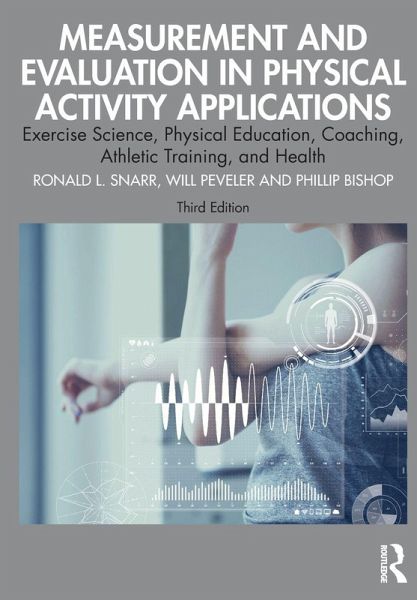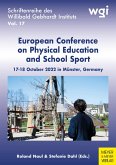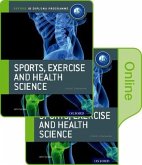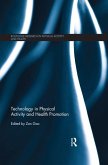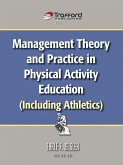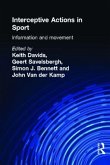Phillip Bishop, Ron Snarr, Will Peveler
Measurement and Evaluation in Physical Activity Applications
Exercise Science, Physical Education, Coaching, Athletic Training, and Health
Phillip Bishop, Ron Snarr, Will Peveler
Measurement and Evaluation in Physical Activity Applications
Exercise Science, Physical Education, Coaching, Athletic Training, and Health
- Broschiertes Buch
- Merkliste
- Auf die Merkliste
- Bewerten Bewerten
- Teilen
- Produkt teilen
- Produkterinnerung
- Produkterinnerung
This book offers a student-friendly introduction to the principles and practice of measurement and evaluation. Spanning applications in exercise science, sport performance, physical education, coaching, training, health, and physical/occupational therapy, the book includes chapters on the key principles underlying good measurement practice.
Andere Kunden interessierten sich auch für
![European Conference on Physical Education and School Sport European Conference on Physical Education and School Sport]() European Conference on Physical Education and School Sport19,95 €
European Conference on Physical Education and School Sport19,95 €![Oxford IB Diploma Programme: IB Sports, Exercise and Health Science Print and Online Course Book Pack Oxford IB Diploma Programme: IB Sports, Exercise and Health Science Print and Online Course Book Pack]() John SprouleOxford IB Diploma Programme: IB Sports, Exercise and Health Science Print and Online Course Book Pack109,99 €
John SprouleOxford IB Diploma Programme: IB Sports, Exercise and Health Science Print and Online Course Book Pack109,99 €![Technology in Physical Activity and Health Promotion Technology in Physical Activity and Health Promotion]() Technology in Physical Activity and Health Promotion70,99 €
Technology in Physical Activity and Health Promotion70,99 €![Reimagining Talent Development in Sport Reimagining Talent Development in Sport]() Andy BorrieReimagining Talent Development in Sport58,99 €
Andy BorrieReimagining Talent Development in Sport58,99 €![Galactic Games Committee Galactic Games Committee]() Griffin ShawGalactic Games Committee26,99 €
Griffin ShawGalactic Games Committee26,99 €![Management Theory and Practice in Physical Activity Education (Including Athletics) Management Theory and Practice in Physical Activity Education (Including Athletics)]() F. Zeigler Earle F. ZeiglerManagement Theory and Practice in Physical Activity Education (Including Athletics)22,99 €
F. Zeigler Earle F. ZeiglerManagement Theory and Practice in Physical Activity Education (Including Athletics)22,99 €![Interceptive Actions in Sport Interceptive Actions in Sport]() Keith Davids / John Kamp (eds.)Interceptive Actions in Sport91,99 €
Keith Davids / John Kamp (eds.)Interceptive Actions in Sport91,99 €-
-
-
This book offers a student-friendly introduction to the principles and practice of measurement and evaluation. Spanning applications in exercise science, sport performance, physical education, coaching, training, health, and physical/occupational therapy, the book includes chapters on the key principles underlying good measurement practice.
Hinweis: Dieser Artikel kann nur an eine deutsche Lieferadresse ausgeliefert werden.
Hinweis: Dieser Artikel kann nur an eine deutsche Lieferadresse ausgeliefert werden.
Produktdetails
- Produktdetails
- Verlag: Taylor & Francis Ltd
- 3. Auflage
- Seitenzahl: 320
- Erscheinungstermin: 10. März 2025
- Englisch
- Abmessung: 246mm x 174mm
- ISBN-13: 9781032719498
- ISBN-10: 1032719494
- Artikelnr.: 71848039
- Herstellerkennzeichnung
- Libri GmbH
- Europaallee 1
- 36244 Bad Hersfeld
- gpsr@libri.de
- Verlag: Taylor & Francis Ltd
- 3. Auflage
- Seitenzahl: 320
- Erscheinungstermin: 10. März 2025
- Englisch
- Abmessung: 246mm x 174mm
- ISBN-13: 9781032719498
- ISBN-10: 1032719494
- Artikelnr.: 71848039
- Herstellerkennzeichnung
- Libri GmbH
- Europaallee 1
- 36244 Bad Hersfeld
- gpsr@libri.de
Ronald Snarr, PhD is an Associate Professor of Exercise Science at Texas A&M University - Corpus Christi, USA. His current research interests include high-intensity interval training, instability training, electromyography, body composition, as well as adapted and tactical athlete performance. He has published over 75 peer-reviewed manuscripts, was co-editor of the 3rd Edition of the NSCA's Essentials of Personal Training, and has presented at multiple national and regional conferences. He is a Fellow of the American College of Sports Medicine (ACMS), certified Strength and Conditioning Specialist (CSCS,*D), Certified Personal Trainer (NSCA-CPT*D), Tactical Strength & Conditioning Facilitator (TSAC-F*D) and Certified Exercise Physiologist (EP-C) with 15+ years of experience working with athletes at the Olympic, professional, and collegiate levels. Will Peveler, PhD serves as a Professor in Exercise Science at Liberty University, USA with over 20 years of teaching experience. His field of study is exercise science, and he has specialised in this area with a focus on physiological and biomechanical factors that affect human performance in both sport performance and combat operations. He has an extensive background in the sports of cycling, running, triathlon and mixed martial arts. Phil Bishop, PhD is Emeritus Professor of Exercise Science at the Univ. of Alabama, USA. During his 33 years as a University teacher he published >200 refereed papers, made over 400 professional presentations and chaired 52 Ph.D. dissertations, all of this providing an excellent foundation for writing on applied statistics. Currently he works for Cru, travelling around the USA and the world speaking on professional and spiritual topics.
1. Measurement and Evaluation for Your Personal and Professional Life
2. The Challenge of Good Measurement: Validity
3. Additional Challenges of Good Measurement: Reliability and Objectivity
4. Understanding Validity
5. Evaluating Validity: Introduction to Statistics
6. Evaluating Validity: T-Tests and Correlations
7. Evaluating Validity for Ordinal Measures, and Error Analysis
8. Evaluating the Validity of Criterion-Referenced Measures
9. Understanding, Calculating, and Evaluating Reliability
10. Understanding, Calculating, and Evaluating Objectivity
11. Devising Measurements
12. Evaluating New Measurements
13. Numbers and Statistics in Measurement
14. Standard Scores
15. Practical Inferential Statistics
16. Misusing Statistics
17. Measuring In Quantitative Research
18. Qualitative Research and Reading Research
19. Measuring Physical Fitness
20. Measuring Body Composition and Range of Motion, and Administering Tests
21. Measuring Exercise and Physical Activity
22. Measuring Health
23. Measuring Psychomotor Performance and Sports Skills
24. Measuring Skills with Rubrics
25. Measuring in Sports and Coaching
26. Alternative Approaches to Measurement and Subjective Measurement
27. Measuring the Affective Domain
28. Measuring and Evaluating Knowledge
29. Creating and Evaluating Cognitive Tests no references
30. Grading
2. The Challenge of Good Measurement: Validity
3. Additional Challenges of Good Measurement: Reliability and Objectivity
4. Understanding Validity
5. Evaluating Validity: Introduction to Statistics
6. Evaluating Validity: T-Tests and Correlations
7. Evaluating Validity for Ordinal Measures, and Error Analysis
8. Evaluating the Validity of Criterion-Referenced Measures
9. Understanding, Calculating, and Evaluating Reliability
10. Understanding, Calculating, and Evaluating Objectivity
11. Devising Measurements
12. Evaluating New Measurements
13. Numbers and Statistics in Measurement
14. Standard Scores
15. Practical Inferential Statistics
16. Misusing Statistics
17. Measuring In Quantitative Research
18. Qualitative Research and Reading Research
19. Measuring Physical Fitness
20. Measuring Body Composition and Range of Motion, and Administering Tests
21. Measuring Exercise and Physical Activity
22. Measuring Health
23. Measuring Psychomotor Performance and Sports Skills
24. Measuring Skills with Rubrics
25. Measuring in Sports and Coaching
26. Alternative Approaches to Measurement and Subjective Measurement
27. Measuring the Affective Domain
28. Measuring and Evaluating Knowledge
29. Creating and Evaluating Cognitive Tests no references
30. Grading
1. Measurement and Evaluation for Your Personal and Professional Life
2. The Challenge of Good Measurement: Validity
3. Additional Challenges of Good Measurement: Reliability and Objectivity
4. Understanding Validity
5. Evaluating Validity: Introduction to Statistics
6. Evaluating Validity: T-Tests and Correlations
7. Evaluating Validity for Ordinal Measures, and Error Analysis
8. Evaluating the Validity of Criterion-Referenced Measures
9. Understanding, Calculating, and Evaluating Reliability
10. Understanding, Calculating, and Evaluating Objectivity
11. Devising Measurements
12. Evaluating New Measurements
13. Numbers and Statistics in Measurement
14. Standard Scores
15. Practical Inferential Statistics
16. Misusing Statistics
17. Measuring In Quantitative Research
18. Qualitative Research and Reading Research
19. Measuring Physical Fitness
20. Measuring Body Composition and Range of Motion, and Administering Tests
21. Measuring Exercise and Physical Activity
22. Measuring Health
23. Measuring Psychomotor Performance and Sports Skills
24. Measuring Skills with Rubrics
25. Measuring in Sports and Coaching
26. Alternative Approaches to Measurement and Subjective Measurement
27. Measuring the Affective Domain
28. Measuring and Evaluating Knowledge
29. Creating and Evaluating Cognitive Tests no references
30. Grading
2. The Challenge of Good Measurement: Validity
3. Additional Challenges of Good Measurement: Reliability and Objectivity
4. Understanding Validity
5. Evaluating Validity: Introduction to Statistics
6. Evaluating Validity: T-Tests and Correlations
7. Evaluating Validity for Ordinal Measures, and Error Analysis
8. Evaluating the Validity of Criterion-Referenced Measures
9. Understanding, Calculating, and Evaluating Reliability
10. Understanding, Calculating, and Evaluating Objectivity
11. Devising Measurements
12. Evaluating New Measurements
13. Numbers and Statistics in Measurement
14. Standard Scores
15. Practical Inferential Statistics
16. Misusing Statistics
17. Measuring In Quantitative Research
18. Qualitative Research and Reading Research
19. Measuring Physical Fitness
20. Measuring Body Composition and Range of Motion, and Administering Tests
21. Measuring Exercise and Physical Activity
22. Measuring Health
23. Measuring Psychomotor Performance and Sports Skills
24. Measuring Skills with Rubrics
25. Measuring in Sports and Coaching
26. Alternative Approaches to Measurement and Subjective Measurement
27. Measuring the Affective Domain
28. Measuring and Evaluating Knowledge
29. Creating and Evaluating Cognitive Tests no references
30. Grading

